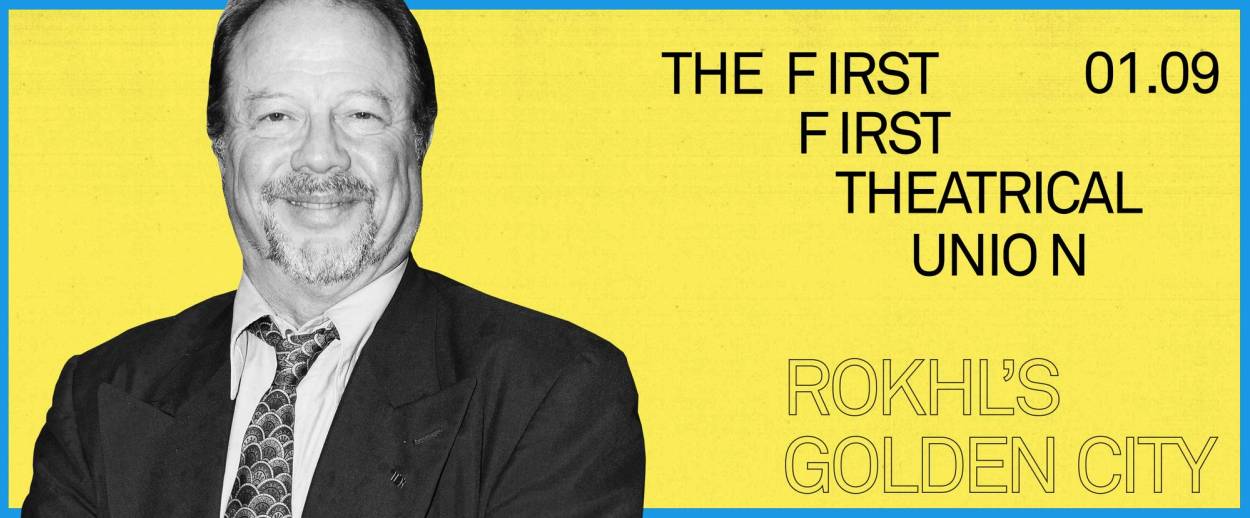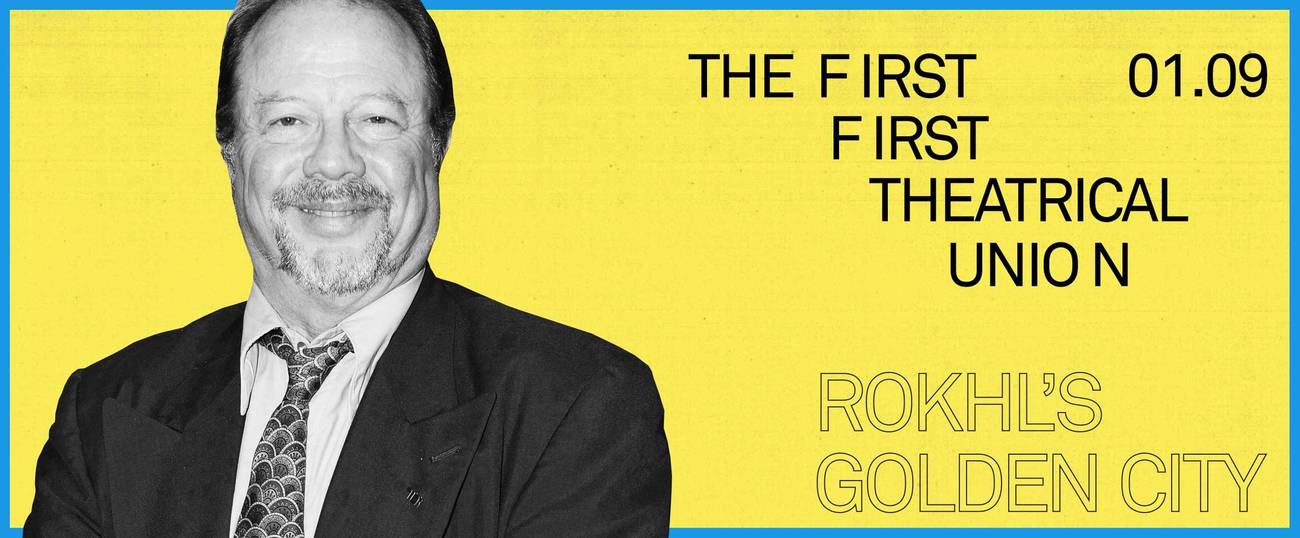Tales of Hoffman
Rokhl’s Golden City: The man behind the first Yiddish Fest




It would be a cliché to say that Avi Hoffman wears many hats as actor/producer/fundraiser for the recently concluded, first-ever YI Loves New York: Yiddish Fest. It would be more accurate to say that when we sat down to talk toward the end of the festival, Hoffman was wearing exactly one hat and four ties. (The ties, covered with Stars of David and Hebrew letters, were a sort of rudimentary costume for the staged reading of L.M. Feldman’s play A People, in which he had just performed.)
Hoffman seemed unusually calm for an actor who had just come off stage and now had to pivot to music producer for that evening’s concert (Frank London’s wildly fun Bagels and Bongos project) and then head into a staged reading the next afternoon. The reading was the festival’s concluding event, an extremely rare performance of legendary Broadway composer Cy Coleman’s last show, The Great Ostrovsky. Hoffman was playing the lead role of Yiddish theater impresario David Ostrovksy. At the mention of the next day’s show, though, a note of weariness broke through Hoffman’s equanimity. “Tomorrow is a very complicated show,” he said with a slight sigh.
He didn’t even know that the following morning, one of the cast members (Yiddish theater superstar Yelena Shmulenson) would call in, immobilized with fever, and he’d have to sub in another actress, named Mia McClain, who would read and sing by sight the entire part, without rehearsal, in front of an audience. (She did a marvelous, heroic job, for the record.)
And that kind of summed up the spirit of Yiddish Fest: unpredictable, a little under-rehearsed, and a lot of unpretentious, dare I say, heymish, fun. I’m an admirer of Hoffman’s work from way back, but I was initially perplexed by his choice to schedule a big Yiddish festival at the same time as, and down the block from, Yiddish New York, a five-day program of music, dance, language, and art-making. What I quickly saw, though, was that there was not much of an overlap between the two audiences. Indeed, most of the people I queried at Yiddish Fest didn’t even know Yiddish New York was happening at the same time. What Hoffman was offering was quite different from the intensive immersion experience of Yiddish New York, but it was received with genuine joy and excitement by his audience—which is all the more amazing considering how it came together.
Where most festivals are planned a year in advance, if not more, Yiddish Fest was put together in a matter of two and a half months, snowballing from a one-show concept to 13 events over nine days at three different venues. Most of the events, however, took place at the Theater for the New City on First Avenue.
Theater for the New City is one of those places where walking through the doors brings you back to a New York that barely exists anymore. It’s an unglitzy space where small, experimental shows can have an audience and none of the productions rely on TV names to draw an audience. Nor do they have to. After many years of precarity, Theater for the New City paid off its mortgage in 2013, giving it a (relative) degree of security few small arts organizations in New York City can claim.
Theater for the New City is unique in another way. At the turn of the last century, the East Village and Lower East Side were home to countless Yiddish theaters, many of which, if they weren’t torn down, transmigrated into English-language theaters or movie theaters. Theater for the New City, however, sits in what was built in 1938 as the First Avenue Retail Market. The market was part of a push by merchants, Mayor Fiorello La Guardia, and Robert Moses, to get “embarrassing” peddlers off the streets and indoors. Needless to say, this was incredibly unpopular with the peddlers; by 1941, New York City’s peddling culture had been virtually eliminated. Moses, an early, vehement opponent of Joseph Papp’s Shakespeare in the Park, would no doubt also hate Theater for the New City, a defiant stronghold of New York art for the masses.
One of the Yiddish Fest events was a concert tribute to Papp (born Yosele Papirovsky), who had a late-in-life return to his own Yiddish roots. In the 1980s, Papp lent his name to a new project called the Joe Papp Yiddish Theater. Avi Hoffman and his mother, Miriam, were both intimately involved. Miriam co-wrote the book for the theater’s Songs of Paradise (based on the poetry of Itzik Manger) and Avi acted in it.
In the early 1990s, Hoffman co-starred in Finkel’s Follies, a Yiddish vaudeville tribute show created for the overnight sensation that was a then-70-year-old Fyvush Finkel. So it was fitting that another Yiddish Fest evening brought together the original cast of Finkel’s Follies for a tribute to Finkel, with video clips standing in for the man himself. Despite the gentleman in the next seat who kept trying to explain Yiddish theater to me, it was a delightful evening for fans of Finkel, and a reminder that not only was Yiddish theater and vaudeville still a presence in the postwar era, it had an influence on American culture, most notably, providing talent like Finkel.
It was also interesting to observe Hoffman, an actor as much at home playing Willie Loman in Yiddish (which he did to much acclaim in 2015) as he is doing Jurassic-era vaudeville shtick.
One of the things Hoffman emphasized to me was that he wanted to build on what he perceived as a growing interest in Yiddish theater, and to bring to light the role of Yiddish theater in New York, and American, theater history. In this he was aided by his friend Howard Teich, who is, among other things, the founder of the New York City Jewish Initiative. It was Teich who made the connection with Ostrovsky co-lyricist Avery Corman. (Cy Coleman passed away in 2004, just a few months after Ostrovsky had its workshop debut in Philadelphia.)
It’s my impression that the study of Yiddish theater in New York is (or was until very recently) curiously cordoned off from the rest of New York theater history. Or rather, the small amount of scholarship that exists on New York Yiddish theater is somehow off to the side and scattered around archives. Which makes no sense, given how foundational Yiddish theater was to American theater. The first theatrical union in the United States was the Hebrew Actors Union, whose building still stands a few blocks away from Theater for the New City and on whose board Hoffman sits.
There’s a narrative around Yiddish theater in New York that, like the peddlers on First Avenue, at a certain point, the Yiddish artists of Second Avenue were all gathered up and swept under a rug, never to be heard from again. But if people are surprised at the wild success of the off-Broadway Yiddish Fiddler, they should be reminded that a young Avi Hoffman saw The Megile of Itzik Manger, in Yiddish, on Broadway in 1968.
In 1995 Hoffman created his one man show Too Jewish at the Westside Theater. And it was in 1995 that the doting dad of a fired-up, baby Yiddishist you now know as Rokhl got tickets to Too Jewish, further cementing what was quickly becoming an obsession. For me, perhaps the most delightful moment of Yiddish Fest was leaving my interview with Hoffman to go meet my dad and stepmom for Chinese food a few blocks away. If you can ever say that a few linear blocks constitute a full circle, I may have made that trip.
AVI IN ACTION: Avi Hoffman and his mother, Miriam, established YI the Yiddishkayt Initiative to “celebrate and promote Jewish history, life and culture and their positive and far-reaching impact on the world.” You can keep up with all his appearances (and news about YiddishFest 2021) over there. … If you’re in Florida this winter, you can catch Hoffman in concert with a show called From Borscht to Broadway: A Second Avenue Legacy. Performances will take place all over south Florida.
ALSO: Sunday, Jan. 19, the New York Jewish Film Festival debuts a stunning find: Broken Barriers, a silent film from 1919. It’s the very first film adaptation of Sholem Aleichem’s Tevye stories, but with a focus on daughter Khavah … The Sholem Aleichem Cultural Center’s first event of 2020 will be an 11th yortsayt program for beloved Yiddish teacher Pesach Fiszman, featuring songs by Maida Feingold. Sunday, Jan. 26, at 1:30 p.m., 3301 Bainbridge Ave., Bronx … The book launch for Troim Katz Handler’s new (bilingual) volume of erotic Yiddish poetry will be at the CYCO Yiddish Book Center. Jan. 27 at 7 p.m. 51-02 21 St., Number A-2, 7th floor, Queens … Tuesday, Feb. 18, is the book launch for Confessions of a Yiddish Writer and Other Essays by Chava Rosenfarb. Known for her postwar Yiddish fiction, this important new volume features English translations of her nonfiction essays, edited by her daughter, Goldie Morgentaler … I’m honored to be moderating an upcoming program at the Museum of Jewish Heritage called “Heroines of the Holocaust.” Dr. Lori Weintrob will lead the discussion and will be joined by Auschwitz survivor Rachel Rachama Roth who will provide her eyewitness testimony to the Warsaw Ghetto Uprising. March 11 at 7:00 p.m., advanced registration highly recommended … After a smashing debut, the second Café Yiddishkayt will take place at the Boston Synagogue, featuring “the most heymish talent the Greater Boston area can provide.” March 19 at 7 p.m., 55 Martha Rd., Boston … You can’t talk about Yiddish kid’s literature without talking about the essential scholarship of Miriam Udel. (Or at least, I can’t.) On April 2, Udel will give the Naomi Prawer Kadar Annual Memorial Lecture on the topic of “How Children’s Literature Made Yiddish Modern.” At Pulitzer Hall, Columbia Graduate School of Journalism.
***
Like this article? Sign up for our Daily Digest to get Tablet magazine’s new content in your inbox each morning.
Rokhl Kafrissen is a New York-based cultural critic and playwright.